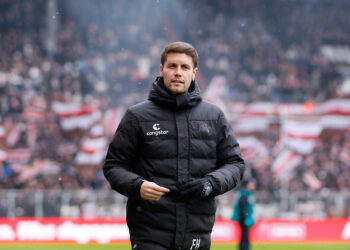Jason Bonham, son of the legendary Led Zeppelin drummer John Bonham, took the stage not to show off — but to honor. With each strike of the drum, Jason channeled not only technical brilliance but a lifetime of memory, loss, and love for his father. As footage of John Bonham played in the background, the energy in the room shifted. This wasn’t just a tribute — it was a conversation between generations. A son speaking to his father in the only language they’ve always shared.
In many ways, Jason Bonham’s journey has been shaped by the towering legacy of his father. John Bonham, widely regarded as one of the greatest rock drummers in history, left an indelible mark on music before his untimely passing in 1980. At the time, Jason was just 14 years old. Though young, he was already deeply influenced by his father’s playing — not just in technique, but in spirit. Over the years, Jason dedicated himself to mastering the craft that defined his father’s life, not to replicate it, but to understand it.
When Jason steps behind the drum kit to play Led Zeppelin’s music, it’s not about imitation. It’s about immersion. He carries the weight of legacy with a reverence that feels both deeply personal and universally moving. Every kick, every snare hit, and every cymbal crash is soaked in the memory of growing up in the shadow of greatness and the ache of losing a father far too soon.

One of the most poignant moments in his career came during the 2007 Led Zeppelin reunion concert at London’s O2 Arena. Jason filled the seat his father once held, performing with Robert Plant, Jimmy Page, and John Paul Jones in a performance that honored the past while forging new emotional territory. Fans and critics alike praised not only his skill but the sincerity with which he approached the task. He wasn’t just filling in — he was *communicating*, creating a bridge between what was and what still lived on in the music.
That same emotional current flows through Jason Bonham’s Led Zeppelin Evening, a tribute project that goes beyond nostalgia. In these shows, Jason not only plays the iconic songs that made Zeppelin legends — he also shares stories, memories, and rare footage of his father. When video of John Bonham playing fills the screen behind him and Jason begins to play alongside it, the moment transcends performance. It becomes something else entirely: a son’s duet with his father across time.

Audiences don’t just witness a rock show — they witness something intimate, something sacred. It’s in those moments when Jason looks up from the kit, eyes glistening under the lights, that you realize this isn’t just about keeping a legacy alive. It’s about keeping a *connection* alive. About continuing a conversation that never really ended — it just changed form.
What sets Jason apart is the authenticity he brings. There’s no ego in his playing, no desire to outshine or to bask in his father’s glow. There’s only devotion. He’s a masterful drummer in his own right, but he uses that mastery not as a spotlight, but as a mirror — reflecting the spirit of his father’s playing, while adding his own voice to the rhythm.
That’s what made that night, and so many nights like it, feel so powerful. Jason wasn’t just honoring John Bonham — he was reminding us all that love, memory, and music can cross even the greatest of distances. That even though time may take people from us, it can’t take *everything*. It can’t take the beat, the pulse, the sound that once brought us together — and still does.
As the video ends and the final crash of the cymbal fades into silence, the crowd rises not just for the music, but for the meaning behind it. Jason Bonham, through sweat and rhythm and memory, gave them more than a concert. He gave them a glimpse of something timeless. A son, still speaking to his father. Still listening. Still playing.













